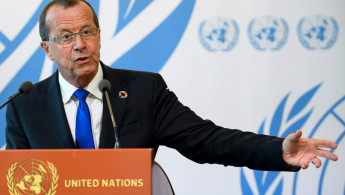UN Libya envoy rules out foreign military intervention
The United Nations special envoy to Libya has ruled out the possibility of a foreign military intervention to help end the conflict in the chaos-ridden North African country.
In an interview with The New Arab in Cairo this week, Martin Kobler said that the only way to solve the crisis was through negotiations between rival Libyan armed forces and groups.
"It's impossible for there to be a military solution in Libya – what happened in 2011 will not happen again," Kobler said, referring to the NATO-backed ousting of longtime dictator Muammar Gaddafi in 2011.
"Dialogue is the only way to get out of this crisis. The international community and the UN are calling for a peaceful political solution."
| Read more on Martin Kobler here: Picking up the pieces: Libya envoy faces tough job |
When asked about his communication with controversial general Khalifa Haftar, the UN envoy said he was reaching out to all parties in the country.
"Haftar is a major player in Libya, he is one of the actors on the ground. My job as envoy is to extend my hand to everyone regardless of their affiliations so that I can find common ground and reconcile points of view."
Kobler added that 2017 would be the year that Libyan parties have to take "critical actions and decisions" to bring an end to the suffering of Libyans and return peace and stability to the country.
The deeply tribal nation has been sharply divided since the 2011 overthrow of Gaddafi, with rival militias vying for influence and control of oil resources.
A power struggle has pit an administration based in eastern Libya, backed by strongman Haftar, against a UN-brokered unity government in Tripoli supported by militias from the western city of Misrata.
The Tripoli-based Government of National Accord [GNA] is the centrepiece of Western hopes to stem an upsurge of extremism in Libya, but it has failed to assert its authority across the country.
The rival authority in the east has refused to cede power and has its own armed forces, which call themselves the Libyan National Army [LNA] and are led by Haftar.
Egypt, the United Arab Emirates and Russia have seen Haftar's forces as the nucleus of a future military, and are suspicious of Islamist influence in Tripoli.






![Israeli forces ordered bombed Gaza's Jabalia, ordering residents to leave [Getty]](/sites/default/files/styles/image_330x185/public/2176418030.jpeg?h=a5f2f23a&itok=_YGZaP1z)
